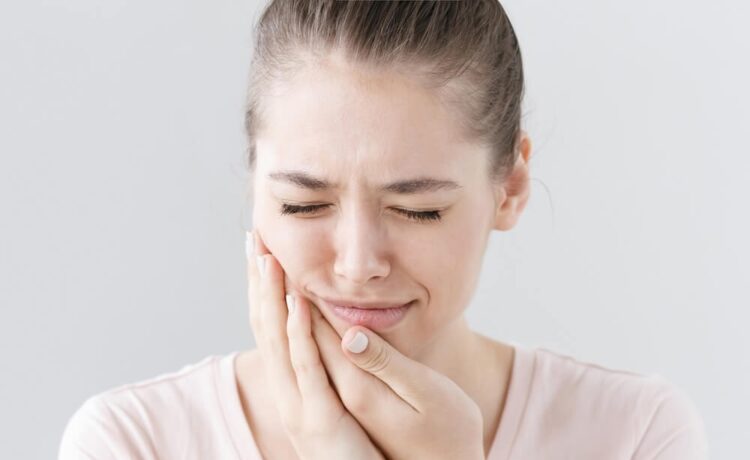Often, dental pain can seem to radiate to other areas. This can be a sign of an underlying issue, such as tooth abscess or jaw tension.
Ear and jaw pain are part of the trigeminal system, a set of three-pronged sensory nerves that encapsulate the head and face. Problems in this system can lead to ear pain from tooth, neck pain, and headaches.
Tooth Decay
When you eat or drink sugary or starchy foods, plaque, a sticky film of bacteria, builds up on your teeth. The bacteria in the plaque produce acids that attack tooth enamel. These acids eat away at the minerals in your teeth, leaving behind holes (cavities) that your dentist has to repair with a filling.
Tooth decay can cause pain, sensitivity, and even abscesses in your mouth. The first sign of decay is often a white spot where minerals are missing from the enamel.
You may be able to stop or reverse this early stage of tooth decay, and even improve it, if you make changes to your diet and oral hygiene. You can also get fluoride from toothpaste, water and other sources to help your enamel repair itself.
If left untreated, a cavity can progress to reach the inner layer of the tooth called dentin, which is softer than enamel and more sensitive to acid damage. When the decay reaches dentin, it can affect the nerves in the tooth and cause sensitivity to hot or cold food and drink.
Your dentist will examine your teeth and X-ray your mouth to determine the extent of the decay. If a cavity is detected, it is important to have a dental check-up as soon as possible so the decay can be treated before it reaches the pulp in your tooth and causes serious problems.
The longer a tooth is exposed to the acid from plaque, the more likely it is to develop a cavity. You can avoid most cavities with proper oral hygiene and regular dental check-ups.
When your dentist detects the beginnings of tooth decay, they may apply a fluoride treatment to prevent future decay and to restore the mineral in the damaged area. They can also place a crown on a tooth that has been affected by decay.
Tooth decay is the most common cause of tooth loss in children and adults. A person can help prevent tooth decay by avoiding sugary and starchy foods and drinks, practicing good oral hygiene, and getting regular dental checkups.
Impacted Teeth
Impacted teeth are a common problem in children and adolescents. While most commonly associated with wisdom teeth, they can happen to any tooth in the mouth.
Typically, teeth start to erupt during infancy and are replaced by permanent teeth as we age. When a baby tooth fails to fall out when it should, or when there is not enough room for it to erupt, it can be considered an impacted tooth.
In many cases, this can be caused by a number of factors. Sometimes a baby tooth falls out and the space is crowded by other teeth, or a cyst may develop in the area of the missing tooth and block the path to its replacement.
It can also be the result of a tooth pushing out in the wrong direction or position, such as if your child has a bite misalignment and doesn’t have all their teeth in place (malocclusion).
Teeth that don’t grow properly can lead to serious dental problems. These issues are often linked to the onset of gum disease and/or tooth decay, so it’s important to see your dentist immediately if you’re experiencing any symptoms.
Pain around an impacted tooth can be very painful, especially if you’re chewing. The pressure and tension from an impacted tooth can cause severe pain, and it can become increasingly worse as it begins to cause problems for other teeth nearby.
Bacteria can build up in the space and begin to spread, causing tooth decay and other oral issues. If you’re having trouble chewing because of an impacted wisdom tooth, contact your dentist for treatment as soon as possible.
Symptoms can include difficulty eating, bad breath, and pain when you chew or speak. Your doctor will likely examine you and take X-rays of your mouth to determine if the impacted tooth is causing the problem.
If you suspect that you or your child has an impacted tooth, schedule an appointment with the team at OMSNashville today! Our experienced dentists will be able to help you diagnose the problem and provide you with a plan for treatment.
Jaw Tension
When a jaw pain is constant or worsens and doesn’t go away, it can indicate a serious dental problem. It’s important to make an appointment with your dentist so they can examine your mouth and determine the cause of your jaw pain.
The joint that connects your skull to your jaw is called a temporomandibular joint (TMJ). If this joint gets damaged or misaligned, you might experience tenderness, headaches, and pain when chewing or opening your mouth.
TMJ disorders can also be caused by arthritis in the joint, or by trauma to the joint, such as a fracture. A person with a TMJ disorder might also have a tight neck muscle and may have trouble opening their mouth wide or keeping their jaw closed properly.
Another common cause of jaw pain is stress. Chronic tension can lead to clenching and grinding of the teeth, which can damage your jaw bones. Teeth that have been chipped or cracked can also lead to jaw pain because they are unable to move properly.
You can avoid jaw tension by avoiding certain foods that require a lot of chewing, such as gum or beef jerky. You can also relax the muscles of your mouth by using meditation or yoga to calm your mind and reduce your stress levels.
Acupuncture can also relieve tension in the jaw and neck. It can also be helpful for relieving headaches, because it helps reduce the inflammation of the nerves in the area.
It’s also a good idea to stay away from caffeine, as it can increase your risk of jaw tension and migraines.
Finally, it’s important to remember that a sinus infection or cold can cause jaw pain. Sinuses are air-filled cavities that sit close to the TMJ, and they can become infected if the sinuses get inflamed or irritated.
If you’re experiencing jaw pain that’s accompanied by shortness of breath, chest discomfort, or other symptoms that suggest a heart attack, call 911 immediately. This is by far the most serious and life-threatening jaw pain.
Sinus Infections
The sinuses are air-filled spaces inside the skull behind the nose and cheeks. They are filled with mucus, which helps to protect you from infection. However, when the mucus is too thick or blocked by other conditions, bacteria and germs can grow.
Sinus infections can cause uncomfortable symptoms like facial pain and pressure, runny nose, coughing, and headache. It may also cause mucus to drip from the nose and throat into your mouth, a condition known as postnasal drip. This can lead to tooth pain as the nerves connected to your teeth can be irritated.
If you have a sinus infection, your doctor will likely prescribe antihistamines, decongestants and medicines to thin your mucus. These are available over the counter in pill, liquid or nasal spray form. Your doctor might also prescribe a mucolytic medicine, which works to make your mucus less sticky and easier to clear out.
Some doctors might also prescribe oral corticosteroids, which are powerful medicines that help reduce inflammation. They can be used to treat chronic sinusitis that doesn’t respond to other medicines.
Other treatment options include breathing in hot, moist air, taking a hot shower twice a day and rinsing your sinuses with a saline solution. Some people find that a nasal sprayer, a neti pot or a nasal irrigation system can also help relieve their sinus symptoms.
Using over-the-counter pain medications such as ibuprofen (Advil, Motrin) or acetaminophen (Tylenol) can also be helpful. Topical numbing pastes or gels that contain benzocaine (Anbesol, Orajel) can also be used to relieve pain.
If you have severe sinusitis that doesn’t improve with over-the-counter treatments, your GP might refer you to an ear, nose and throat specialist, or ENT doctor. ENT specialists can perform sinus surgery to remove blockages or swollen tissue that causes sinus problems.













